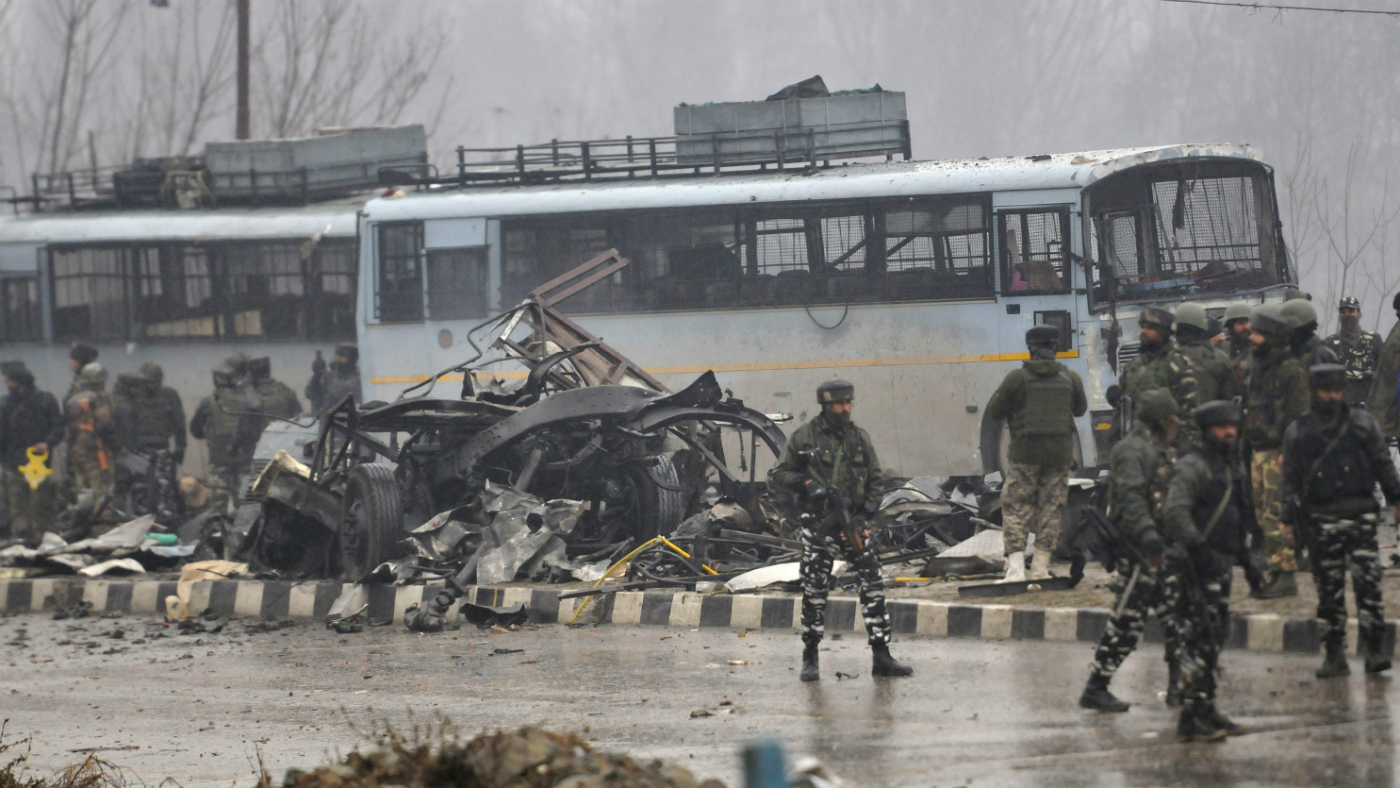India vows to ‘isolate’ Pakistan after Kashmir suicide bombing kills dozens
Indian PM Narendra Modi says Delhi has ‘incontrovertible evidence’ that Islamabad supported terrorists behind the attack

A free daily email with the biggest news stories of the day – and the best features from TheWeek.com
You are now subscribed
Your newsletter sign-up was successful
India has warned that it will seek the “complete isolation” of Pakistan in the wake of a deadly car bombing by pro-Pakistan separatists in the disputed Kashmir province.
A bus carrying Indian Central Reserve Police Force (CRPF) personnel was rammed by an explosive-laden car yesterday afternoon near Pulwama, killing at least 46 paramilitary troops. Responsibility for the attack was quickly claimed by Pakistan-based terrorist group Jaish-e-Mohammad (JeM), which seeks to reclaim Kashmir from India.
The Indian government claims to have “incontrovertible evidence” of collusion between the attackers and Pakistani authorities, although this has yet to be produced, reports the BBC.
The Week
Escape your echo chamber. Get the facts behind the news, plus analysis from multiple perspectives.

Sign up for The Week's Free Newsletters
From our morning news briefing to a weekly Good News Newsletter, get the best of The Week delivered directly to your inbox.
From our morning news briefing to a weekly Good News Newsletter, get the best of The Week delivered directly to your inbox.
Tensions have been high in the region for decades, with multiple armed conflicts and insurgencies, but this week’s attack appears to have pushed India over the edge. Prime Minister Narendra Modi today promised a “strong response” to Pakistan’s alleged direct involvement in the attack.
“Those who committed this heinous act will pay a heavy price. Those who supported it will definitely be punished,” Modi said. “If our neighbour thinks it can destabilise India then it is making a big mistake.”
India’s Minister of Finance and Corporate Affairs Arun Jaitley echoed that warning in a tweet.
Indian Foreign Secretary Vijay Gokhale has summoned Pakistan’s envoy, Sohail Mahmood, and served a diplomatic notice demanding that Islamabad take action against JeM, which has been banned in Pakistan since 2002.
A free daily email with the biggest news stories of the day – and the best features from TheWeek.com
Meanwhile, Jaitely told reporters that India will remove “most-favoured-nation privileges given to Pakistan under World Trade Organization rules”, reports Al Jazeera.
But Sreeram Chaulia, professor of international relations at India’s Jindal School of International Affairs, told the news site that revoking trade privileges will not “hurt much”, as “Pakistan exports less than $1bn worth of products to India because of strained relations”.
Indian news network NDTV reports that a government delegation “has started meeting envoys of the United Nation P5”, the five permanent member nations of the UN Security Council, “to brief them about Pakistan’s role in sponsoring terror”.
In a statement issued today, Pakistan’s Ministry of Foreign Affairs called the attack a matter of “grave concern”, but added: “We strongly reject any insinuation by elements in the Indian government and media circles that seek to link the attack to the State of Pakistan without investigations.”
-
 Why are election experts taking Trump’s midterm threats seriously?
Why are election experts taking Trump’s midterm threats seriously?IN THE SPOTLIGHT As the president muses about polling place deployments and a centralized electoral system aimed at one-party control, lawmakers are taking this administration at its word
-
 ‘Restaurateurs have become millionaires’
‘Restaurateurs have become millionaires’Instant Opinion Opinion, comment and editorials of the day
-
 Earth is rapidly approaching a ‘hothouse’ trajectory of warming
Earth is rapidly approaching a ‘hothouse’ trajectory of warmingThe explainer It may become impossible to fix
-
 Epstein files topple law CEO, roil UK government
Epstein files topple law CEO, roil UK governmentSpeed Read Peter Mandelson, Britain’s former ambassador to the US, is caught up in the scandal
-
 Iran and US prepare to meet after skirmishes
Iran and US prepare to meet after skirmishesSpeed Read The incident comes amid heightened tensions in the Middle East
-
 EU and India clinch trade pact amid US tariff war
EU and India clinch trade pact amid US tariff warSpeed Read The agreement will slash tariffs on most goods over the next decade
-
 Israel retrieves final hostage’s body from Gaza
Israel retrieves final hostage’s body from GazaSpeed Read The 24-year-old police officer was killed during the initial Hamas attack
-
 China’s Xi targets top general in growing purge
China’s Xi targets top general in growing purgeSpeed Read Zhang Youxia is being investigated over ‘grave violations’ of the law
-
 Panama and Canada are negotiating over a crucial copper mine
Panama and Canada are negotiating over a crucial copper mineIn the Spotlight Panama is set to make a final decision on the mine this summer
-
 Why Greenland’s natural resources are nearly impossible to mine
Why Greenland’s natural resources are nearly impossible to mineThe Explainer The country’s natural landscape makes the task extremely difficult
-
 Iran cuts internet as protests escalate
Iran cuts internet as protests escalateSpeed Reada Government buildings across the country have been set on fire